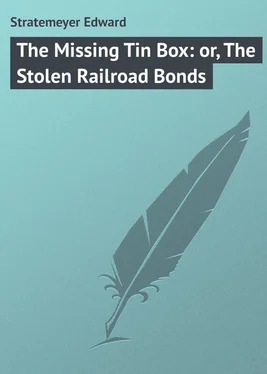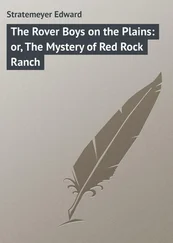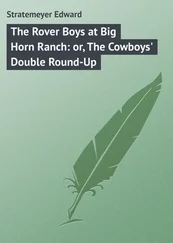Edward Stratemeyer - The Missing Tin Box - or, The Stolen Railroad Bonds
Здесь есть возможность читать онлайн «Edward Stratemeyer - The Missing Tin Box - or, The Stolen Railroad Bonds» — ознакомительный отрывок электронной книги совершенно бесплатно, а после прочтения отрывка купить полную версию. В некоторых случаях можно слушать аудио, скачать через торрент в формате fb2 и присутствует краткое содержание. Жанр: foreign_prose, foreign_children, на английском языке. Описание произведения, (предисловие) а так же отзывы посетителей доступны на портале библиотеки ЛибКат.
- Название:The Missing Tin Box: or, The Stolen Railroad Bonds
- Автор:
- Жанр:
- Год:неизвестен
- ISBN:нет данных
- Рейтинг книги:3 / 5. Голосов: 1
-
Избранное:Добавить в избранное
- Отзывы:
-
Ваша оценка:
- 60
- 1
- 2
- 3
- 4
- 5
The Missing Tin Box: or, The Stolen Railroad Bonds: краткое содержание, описание и аннотация
Предлагаем к чтению аннотацию, описание, краткое содержание или предисловие (зависит от того, что написал сам автор книги «The Missing Tin Box: or, The Stolen Railroad Bonds»). Если вы не нашли необходимую информацию о книге — напишите в комментариях, мы постараемся отыскать её.
The Missing Tin Box: or, The Stolen Railroad Bonds — читать онлайн ознакомительный отрывок
Ниже представлен текст книги, разбитый по страницам. Система сохранения места последней прочитанной страницы, позволяет с удобством читать онлайн бесплатно книгу «The Missing Tin Box: or, The Stolen Railroad Bonds», без необходимости каждый раз заново искать на чём Вы остановились. Поставьте закладку, и сможете в любой момент перейти на страницу, на которой закончили чтение.
Интервал:
Закладка:
"Certainly. It is the first warehouse this side – "
The man got no further. There was a commotion on the street, and two or three rushed outside.
"Brady's place just below here is on fire!" shouted some one.
"Brady's place?" ejaculated the man. "By George! I wonder how that happened?"
He seemed to forget all about Hal, and making a rush for the door, disappeared down the street.
The youth started after him. He had eaten and paid for his meal, and he did not wish to miss the opportunity of questioning the fellow further.
On the street all was commotion. Wagons were scattering right and left to make way for the steam engines, hose carts and hook and ladder trucks which came dashing up to the spot.
Hal soon found himself surrounded by a crowd. The man had disappeared, apparently for good, and with a sigh the youth walked away, there being no signs of a fire, so far as he could see.
The youth started to cross the street. He was directly behind an elderly gentleman, and was about to pass the man when there came a warning cry:
"Get out of the way there! Here comes another engine!"
Hal looked up and saw that the engine, pulled by three fiery horses, was close at hand. He started to return to the curb. As he did so the elderly gentleman slipped and went down flat on his back.
"He'll be killed!" cried half a dozen, who saw the accident.
Hal's heart seemed to leap into his throat. The horses were not over ten feet away. A moment more and the elderly gentleman would be crushed to death.
The youth leaped forward, and caught the man by the arm. Then he gave a sudden jerk backward, and both he and the gentleman went rolling into the gutter, while the engine went thundering by.
CHAPTER II.
A BRAVE YOUTH'S REWARD
A cheer arose from the by-standers.
"Good for the boy!"
"That's what I call a genuine hero!"
"He deserves a medal."
Paying no attention to what was said, Hal assisted the elderly gentleman to his feet.
"Are you hurt, sir?" he asked kindly.
"I – I think not," was the labored reply. "That was a narrow escape, young man." The last with a gasp.
"You are right, sir. How did you happen to go down?"
"The snow made a slippery spot on the ice, I believe. My wind is almost gone."
"Wait till I brush you off," said Hal, and taking off his cap he commenced to strike off the snow and dirt from the gentleman's clothing.
"Oh, never mind that," was the comment. "Come along with me. I don't like crowds."
The gentleman caught the youth by the arm, and walked him toward Broadway.
"You did me a great service," he went on, as the two stood on the corner, opposite the post-office.
"I didn't do much," replied Hal, modestly.
"Don't you call saving my life much?" asked the man, with a smile.
"Oh, I don't mean that, sir. But any one would have done what I did."
"I'm not so sure about that. In New York it is every one for himself. What is your name?"
"Hal Carson."
"You live here, I suppose?"
"No, sir."
"Where then, if I may ask?"
"I just came to New York not over half an hour ago. I intend to stay here."
The elderly gentleman looked puzzled.
"I don't quite understand you," he said.
"I came from a small place in Pennsylvania, sir, and I intend to try my luck here."
"Ah! Are you alone?"
"Yes, sir."
"Any friends here?"
"No, sir."
"Yes, you have."
"I have?"
"Yes – myself." The elderly gentleman laughed at his little joke. "No one shall say he saved my life and I didn't appreciate it. So your name is Hal Carson. Parents living?"
"I don't know, sir." Hal blushed in spite of himself. "I was brought up at the poor-house."
"Humph! Well, you are a manly looking chap and a brave one. Have you any idea where you are going to obtain employment?"
"No, sir. I intend to hunt around until I strike something."
"You'll find that rather up-hill work, I fancy."
"I didn't expect any snap, Mr. – "
"My name is Horace Sumner. I am a broker, and have an office on Wall Street, near Broad. I am just returning from a visit to my sister, who lives in Morristown. Have you any sort of an education?"
"I can read and write, and figure pretty well, and I've read all the books I could get hold of."
"The reason I ask is because I think I may be able to help you to obtain employment. I won't offer you money as a reward – I don't believe in such things."
"I would not accept your money. But I would like work."
Horace Sumner meditated for a moment.
"Supposing you stop at my office to-morrow morning," he said.
"I will, sir. What time?"
"Ten o'clock."
"And what number, please?"
"Here is my card." Horace Sumner handed it to him. "Do you know where you are going to stop over night?"
"I shall hunt up some cheap hotel."
Mr. Sumner was about to say something to the effect that Hal could accompany him to his house and sleep in one of the rooms over the barn, but he changed his mind.
"Let the boy hoe his own row. It will do him good," he thought to himself.
Horace Sumner was a self-made man, and he knew that self reliance is one of the best traits a boy can cultivate.
"I am going over to the Third Avenue elevated now," he said. "Remember, I expect to see you at ten sharp."
"I will be on hand, sir," returned Hal.
"Then good-night."
"Good-night, Mr. Sumner, and much obliged."
Hal watched the gentleman cross City Hall Park, and then started up Broadway.
The brilliant holiday display in the show windows charmed him, and he spent fully two hours in looking at all that was to be seen.
"Who knows but what I may go to work to-morrow, and then I won't get much chance to look around," he reasoned to himself.
He was accustomed to work at the poor-house from six in the morning until eight or nine at night, and he did not know but what he would have to do more in such a bustling city as New York.
By ten o'clock Hal found himself tired out. The snow was now six inches deep and was still coming down.
He turned from Broadway through Grand Street and presently found himself well over on the east side.
"Good Beds for 25 Cents per Night."
This was the announcement on a banner strung over the sidewalk, and after reading it, Hal glanced at the building.
It was rather a dingy affair, but to the youth direct from the Fairham poor-house it appeared quite comfortable. He entered the office, and approached the clerk at the desk.
"I would like a room for to-night," he said.
"A room or a bed?" asked the clerk.
"I mean a twenty-five cent place."
"Oh, all right. Pay in advance."
Hal handed out a quarter. Then he was conducted to a long, narrow apartment on the third floor. There were eight beds in the room, six of which were already occupied.
To a person used to good accommodations this apartment would have almost disgusted him. But quarters at the poor-house had been but little better, and Hal did not complain. He managed to get a bed in one corner, and, as the window was slightly open, he slept very well.
He was up and dressed at six o'clock and out on the street. The snow was now all of a foot deep, and Hal was much interested in the snow-plows on the car tracks.
As he passed down the street a snow-ball whizzed past the youth's ear. Another followed, striking him in the head. He turned, and saw a boy slightly taller than himself standing close at hand and laughing heartily.
Instead of getting angry, Hal laughed in return. Then he picked up some snow, made it into a hard ball, and let fly.
The snow-ball took the other boy in the chest, and in his effort to dodge he went over head first into a drift near the gutter. Hal burst out laughing, and then ran back and helped the stranger up.
Читать дальшеИнтервал:
Закладка:
Похожие книги на «The Missing Tin Box: or, The Stolen Railroad Bonds»
Представляем Вашему вниманию похожие книги на «The Missing Tin Box: or, The Stolen Railroad Bonds» списком для выбора. Мы отобрали схожую по названию и смыслу литературу в надежде предоставить читателям больше вариантов отыскать новые, интересные, ещё непрочитанные произведения.
Обсуждение, отзывы о книге «The Missing Tin Box: or, The Stolen Railroad Bonds» и просто собственные мнения читателей. Оставьте ваши комментарии, напишите, что Вы думаете о произведении, его смысле или главных героях. Укажите что конкретно понравилось, а что нет, и почему Вы так считаете.












